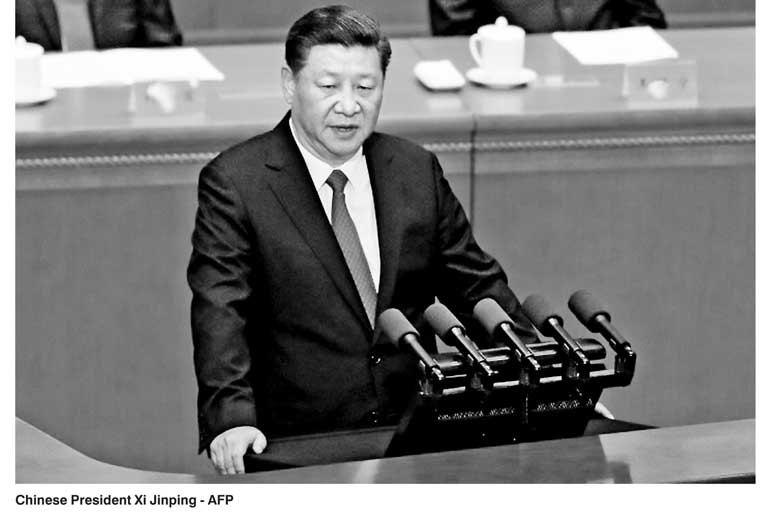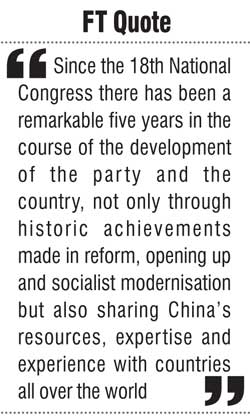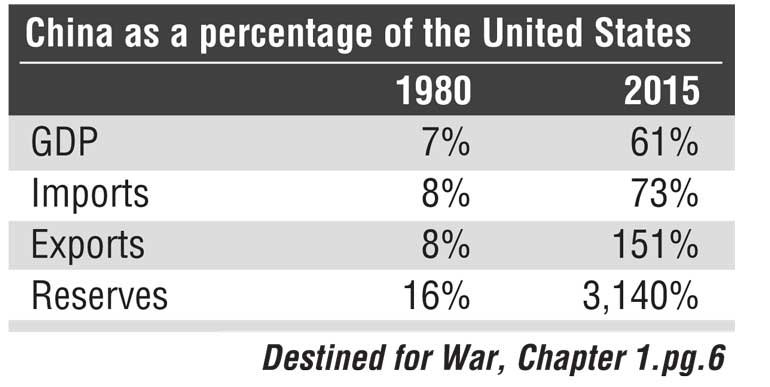Wednesday Feb 25, 2026
Wednesday Feb 25, 2026
Saturday, 16 December 2017 00:53 - - {{hitsCtrl.values.hits}}
 By Luxman Sirwardena
By Luxman Sirwardena
The 19th CPC Congress, which expounded the theme of socialism with Chinese characteristics, declared that its foundation was based on Marxism-Leninism, Mao Zedong Thought, Deng Xiaoping Theory and Xi Jinping’s Thoughts on Socialism with Chinese Characteristics for a New Era.
On the basis of an analysis of the developments in the international and domestic environments and a review of the party’s work and the historic changeover during the past five years, the Congress forms the major political judgments that socialism with Chinese characteristics has entered a new era. It concludes that the principal contradiction in Chinese society has evolved into one between unbalanced and inadequate development and the people’s ever-growing need and desire for a better life.
The Congress has elaborated on the party’s mission in the new era and established the historical position of Xi Jinping’s Thought. It sets forth the basic policy for upholding and developing socialism with Chinese characteristics in the new era, and establishes the goal of securing a decisive victory in building a moderately prosperous society in all respects and then embarking on a journey to fully build a modern socialist China.
The Congress also sets out an overall plan for advancing the great cause of socialism with Chinese characteristics and the great new project of party building in the new era.
There is no doubt that the theme expounded on in the report is of enormous importance to the party leading the people toward a stronger China as well as the world in general and developing countries in particular.
The declaration that “every one of us in the party must remain true to our original aspiration and keep our mission firmly in mind, hold high the banner of socialism with Chinese characteristics, secure a decisive victory in building a moderately prosperous society in all respects, strive for the great success of socialism with Chinese characteristics for a new era and work tirelessly to realise the Chinese dream of national rejuvenation” should also be always added with China’s role in uplifting the masses of the developing world.
Since the 18th National Congress there has been a remarkable five years in the course of the development of the party and the country, not only through historic achievements made in reform, opening up and socialist modernisation but also sharing China’s resources, expertise and experience with countries all over the world.
The party and the country unleashed a powerful sense of mission as it has developed new thinking and new strategies which launched a host of major initiatives both domestically and internationally. It has thus solved many complicated problems that were long on the agenda but were never resolved, accomplished many things that were wanted but never done and prompted historic shifts in the cause of the party and the country.
It is an obvious fact that President Jinping at the party’s core has acted with determination to confront major risks and tests facing China.
Discipline in the party and the country as a whole
The most exemplary campaign of the party and China which was implemented with a firm resolve was the anti-corruption drive. As a result, both the intraparty political atmosphere and the political ecosystem of the party as well as the country as a whole are reported to have improved markedly.
In spite of the fact that the Western media has downplayed the anti-corruption drive and the emphasis of the rule of law at the 19th Congress, this is a historical first in terms of scale and effectiveness.

Progress of recent past
The achievements of the past five years have touched every area and broken new ground. The changes in China over the past five years have been profound and fundamental. With decades of hard work, commitment and even some sacrifices by the party and the people in China, socialism with Chinese characteristics has crossed the threshold into a new era. These landmark achievements have brought the country into a new historic and critical juncture in its development. In order to understand the chain of remarkable achievements, I wish to quote from Graham Allison’s’ book ‘Destined for War: Can America and China Escape Thucydides’ Trap?’
“In a single generation, a nation that did not appear on any of the international league tables has vaulted into the top spot. In 1980, China’s gross domestic product (GDP) was less than $ 300 billion; by 2015, it was $ 11 trillion - making it the world’s second largest economy by market exchange rates. In 1980, China’s trade with outside world amounted to less than $ 40 billion; by 2015, it had increased one hundredfold, to $ 4 trillion. For every two-year period since 2008, the incremental growth in China’s GDP has been larger than the entire economy of India. Even at its lower growth rate in 2015, China’s economy created a Greece every sixteen weeks and an Israel every twenty-five weeks.
“Most (US) students are stunned to learn that on most indicators, China has already surpassed the United States. As the largest producer of ships, steel, aluminium, furniture, clothing, textiles, cell phones and computers, China has become the manufacturing powerhouse of the world. Students are even more surprised to discover that China has also become the world’s largest consumer of the most products. America was the birthplace of the automobile but China is now both the automaker and the largest auto market. Chinese consumers bought 20 million cars in 2015 – three million more than were sold in the US. China is also the world’s largest number of the internet users. China imported more oil, consumed more energy and installed more solar power than any other nation. Perhaps most devastatingly for America’s self-conception, in 2016 – as it has since the 2008 worldwide financial crisis – China continued to serve as the primary engine of global economic growth.”
(Destined for War, Chapter 1.pg.9)
This is the unimaginable progress of China led by the CPC with President Jinping at its helm has made during the past five years. Of course the achievements of the past five years are based on the policies and actions implemented over three decades. Otherwise a generation ago, China stood at the bottom of most international rankings in education, science, technology and innovation.
According to Allison, due to correct policies and continuous investment in the country’s human capital today China rivals, and by some measures outperforms, the United States of America. One of his examples is that “in 2015, Tsinghua University passed MIT in the US News and World Report rankings to become the number one university in the world for engineering. Among the top ten schools of engineering, China and the US each had four.”
Socialism with Chinese characteristics the new era
At the 19th Congress, the party has been presented with the proposition that socialism with Chinese characteristics is needed to be addressed as a predominant issue. In approaching the issue of the new era, the CPC has adapted an entirely new perspective to deepen its understanding of the laws that underlie governance by the Communist Party, the development of socialism and the evolution of human society.
It appears that the theoretical exposition in the final analysis has given shape to Jinping’s Thought on Socialism with Chinese Characteristics for a New Era. According to the Congress reports, the social theoretical foundation of this concept – Xi Jinping Thought – has been developed on Marxist, Leninist and Maoist Thoughts.
Interestingly the 14 points the 19th Congress has highlighted as the basic policy underpinnings go beyond Chinese domestic interest and emphasise the need to promote the building of a community with a shared future for the whole of mankind.
 CPC vision for China 2020-2050
CPC vision for China 2020-2050
The Congress sees the next three years up to 2020 as the timeframe and the process of building a moderately prosperous society in China. What’s critically important is the Party Congress’s commitment to build on the achievement of a moderately prosperous society to embark upon a new, not-so-long march towards the second centenary goal of establishing a modern socialist country.
According to the Congress report, based on a comprehensive study and analysis of both local and global determinants, a two-stage development plan has been formulated for the period of 30 years from year 2020-2050.
The Congress report goes on to state: “In the first stage from 2020 to 2035, we will build on the foundation created by the moderately prosperous society with a further 15 years of hard work to see that socialist modernisation is basically realised. In the second stage from 2035 to the middle of the 21st century, we will, building on having basically achieved modernisation, work hard for a further 15 years and develop China into a great modern socialist country that is prosperous, strong, democratic, culturally advanced, harmonious, and beautiful.”
From the point of view of developing countries, what is more relevant and important is China’s new vision of development leading to an advanced modernised economy. The report suggests that: “China must apply a new vision of development and develop a modernised economy. We should put quality first and give priority to performance, pursue supply-side structural reform as our main task and work hard for better quality, higher efficiency and more robust drivers of economic growth through reform. We should accelerate the building of an industrial system that promotes coordinated development of the real economy with technological innovation, modern finance and human resources, and endeavour to develop an economy with more effective market mechanisms, dynamic micro-entities and sound macro-regulation. With this we can steadily strengthen the innovation capacity and competitiveness of China’s economy.
“We should further supply-side structural reform, move faster to make China a country of innovators, pursue a rural vitalisation strategy and the strategy for coordinated regional development, accelerate efforts to improve the socialist market economy, make new ground in pursuing the opening up on all fronts and strive to achieve better quality, more efficient, fairer and more sustainable development.”
As far as the reforms towards economic and social development are concerned, the Congress stresses the need for commitment to the Chinese path of building a modern, strong armed forces, taking into consideration China’s national security needs and responding to the demands of the international community.
In this regard full implementation of Jinping’s ideas on strengthening all the military forces and the formulation and adaptation of military strategy to deal with new conditions are outlined in the Congress report. Therefore the report of the 19th CPC Congress presents an undoubtedly comprehensive analysis of historical, present and future development of the party and people of China while taking into consideration international developments and the community as a whole.
Global impact of 19th CPC Congress
Far-reaching resolutions and decisions arrived at the 19th Party Congress will undoubtedly have many implications on international developments and the behaviour of other global players.
Realising the Chinese dream, the march towards a moderately prosperous, modernised, socialist economy with Chinese characteristics, addressing the principal contradiction of unbalanced growth, further opening up the Chinese economy and the modernisation of the military will have far-reaching and a hitherto unprecedented impact on the international economy, politics and more importantly the balance of power in the coming decades.
Therefore it’s not surprising that many of the western - mostly American - critics have focused their statements on the 19th Congress on the personality and concentration of power in President Jinping and the strengthening of the party and such issues rather than the substantive themes of the Congress resolutions.
However, there are several, mostly European analysts, who have been impressed by the global vision of Jinping’s statements. They have been positive on several concepts related to the Chinese dream, its model of people-centred development, harmony between nature and human beings and realising the shared destiny of mankind.
Rana Mitter, the Director of the Chinese Centre at Oxford University, states his idea on the matter as such: “The most significant part of Xi’s speech at the Congress is that the firm pledge to make China a major actor in the world. At a time of major flux in the world order, it will be increasingly important for China to play a stabilising, responsible role when it comes to questions of trade, security and international order. As China takes on a greater role in the world, it will also have to shoulder many of the responsibilities of a great power, encouraging freer markets and a more transparent international environment. It will also have to tackle issues such as climate change and provide leadership there. The world will be watching from now on.”
It is obvious that positive or negative sentiments expressed are entirely based on the ideological position of each analyst or observer. What is important and relevant to the world community as a whole is the impact on their socioeconomic development, peace, security and environment in which they live.

Let me conclude this article with a few quotations from Kevin Rudd, the former Prime Minister of Australia and current close watcher of developments in China. “When China does become the world’s largest economy over the next decade, the global system will be led by a non-English speaking, non-western, non-democratic state for the first time since George I ruled Great Britain and Ireland. The current rule-based international order will not remain immune from this fundamental geo-economic and geopolitical change. Nor will the conceptual foundation of the West - Judea-Christian values and the enlightened principles of science, liberty and universal human rights - be immune from challenge. To believe otherwise is to wilfully ignore the deep changes.”
Further, Rudd’s article ends with the following: “Since the fall of the Soviet Union, there has been little, if any, grand strategy to guide the future of the West. Instead, we find a West – particularly its twin pillars, the European Union and the US – that is increasingly self-absorbed, self-satisfied and internationally complacent.
“It is sobering to reflect on the fact that the CPC’s 19th National Congress occurs on the 200th anniversary of Napoleon’s famous reflection of China’s prospects and potential. ‘China is a sleeping giant,’ he wrote in 1817 from the splendid isolation of his exile on Saint Helena. Let her sleep, for when she wakes she will move the world’.”
What are the takes of the CPC Congress for the world in general and for developing countries in particular?
The Chinese model of economic development, which has brought forward enormous growth momentum to the Americans, Europeans and people in the rest of the world, will continue to offer benefits in the years to come as China marches towards a moderately prosperous society and beyond.
Chinese innovation-driven future developments will result in similar progress in many other countries due to its demonstration effects or pressure to adapt competitive measures.
The logical outcome of the above two is the unsettling and irrational behaviour of regional bullies whose sense of insecurity has been aggravated due to the emergence of China as a predominant force in the international theatre.
As China aims to become a leading player in the world economic, political and security landscape, international peace and harmony will be further ensured.
The most important phenomenon of China’s emergence as the second largest economy in the world and the most forceful driver of the global development is the dismantling of the world economic order that was established under the Bretton Woods System.
Associated with the decline of the Bretton Woods System is the relative weakening of the international hegemonic powers, most notably by the US.
The entire global economy is likely to benefit from the innovative development initiatives of China such as the Belt and Road, the establishment of AIIB and the Silk Road Fund.
The emphasis at the CPC Conference on the anti-corruption drive, party discipline and the rule of law set examples for the entire world community and the need and approach for more declined and rule-based socioeconomic systems that will deliver and ensure peace and prosperity for mankind.
[The writer is the Executive Director of the Pathfinder Foundation.]